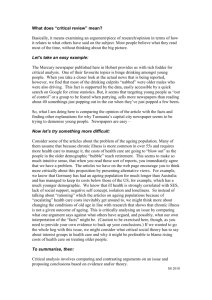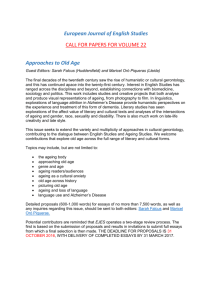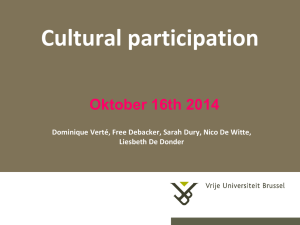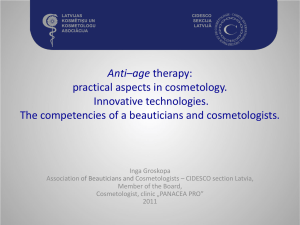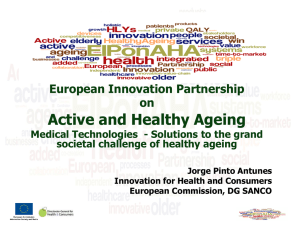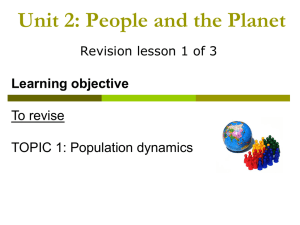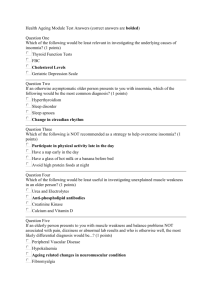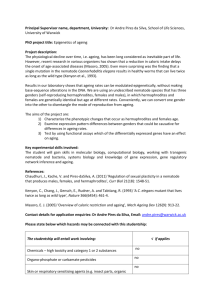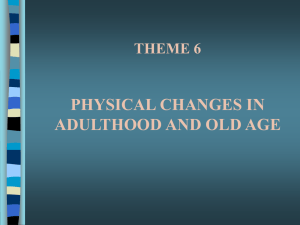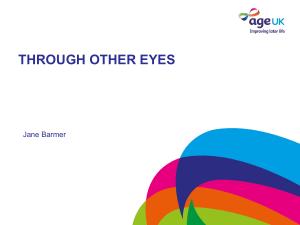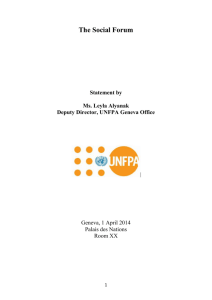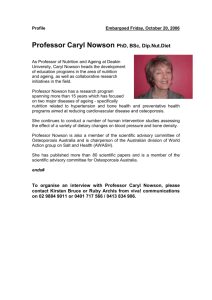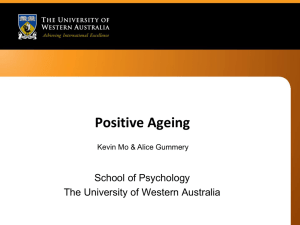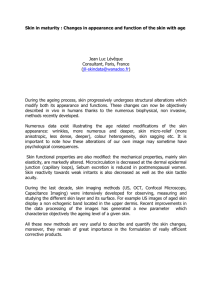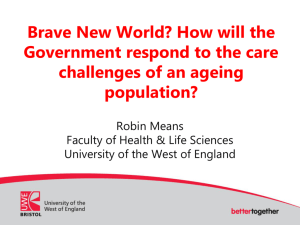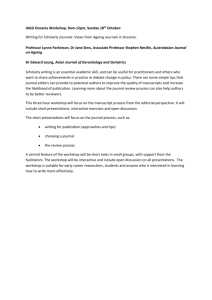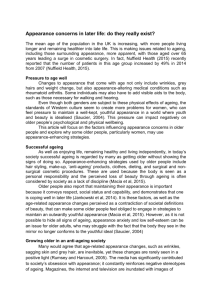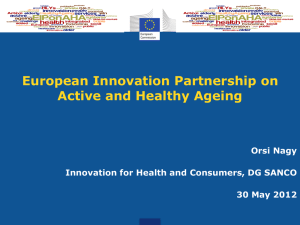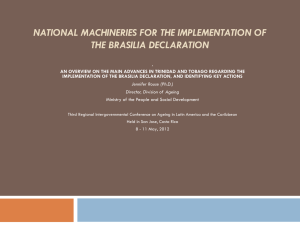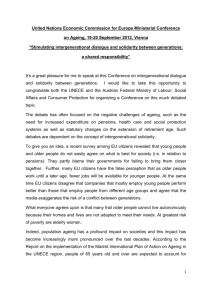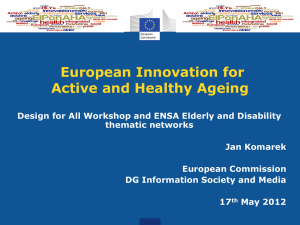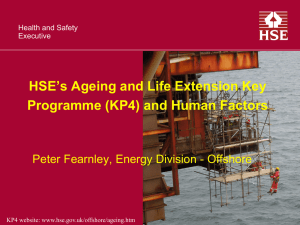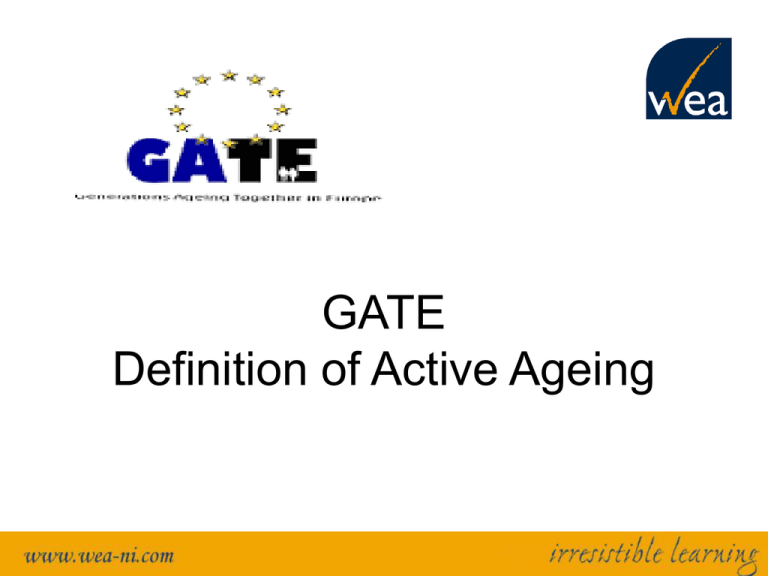
GATE
Definition of Active Ageing
GATE
•
•
•
•
•
•
•
•
Define GATE Definition
Note: We will consider this in the context of the non
deficit model of ageing looking at employability, social
and civic participation including:
Health and Economic Security
Benefits
Social Networks and Friends
Attitudes and Behaviour
Activities – Volunteering
4 Groups – revisit your group findings and collate into
a definition
World Health Organisation Definition
•
•
•
•
•
What is "active ageing"? Active ageing is the process of optimizing
opportunities for health, participation and security in order to enhance
quality of life as people age. It applies to both individuals and population
groups.
Active ageing allows people to realize their potential for physical, social, and
mental well-being throughout the life course and to participate in society,
while providing them with adequate protection, security and care when they
need.
The word “active” refers to continuing participation in social, economic,
cultural, spiritual and civic affairs, not just the ability to be physically active
or to participate in the labour force. Older people who retire from work, ill or
live with disabilities can remain active contributors to their families, peers,
communities and nations. Active ageing aims to extend healthy life
expectancy and quality of life for all people as they age.
“Health” refers to physical, mental and social well being as expressed in the
WHO definition of health. Maintaining autonomy and independence for the
older people is a key goal in the policy framework for active ageing.
Ageing takes place within the context of friends, work associates,
neighbours and family members. This is why interdependence
as well as intergenerational solidarity are important tenets
of active ageing.
Group 1
• Active ageing means to have a role in the society and in the family
• Health and economic security are very fundamental as base to
continue having a good life and giving support to new generation,
passing experiences and values and helping in the volunteering.
• It’s important to accept own limits, to change attitudes and to open
yourself to new experiences and new minds.
• The older people need to make physical and mental activities to
keep alive and healthy. They can put their experience, their abilities
and their enthusiasm in the volunteering associations or cultural
groups.
• Its important getting involved in groups, according to own
preferences.
• Benefits are double for the society and for the older people. The
elder people are involved and valued and the society has fewer
problems, because old people aren’t a burden.
Group 2
•
•
•
•
•
•
•
•
*Mental and physical balance
Cultivation of interests
Keeping up to date (e.g. ITC, cultural, politics)
Pro-long life with quality Social integration
Positive social status
Gender issues especially sex
Cultural issue- regions, social structure and role
Group 3
Health/economic security• Being mentally and physically involved
and included.
• Attitudes + behaviour• Having fun
• Being in control of your life
• Maintenance of self-esteem
• The enthusiasm to want to participate
• Benefits (for the individual, for
society, for family, for community)
• Playing a useful role in family
community + society
• Being active in society. Making use of
experience
• Passing skills/experience from
generation to generation.
Activities/ volunteering• Hearing and teaching
• Caring (intergenerational)
• Volunteering
–
–
–
–
–
–
•
•
Neighbours
Civic
Work places
Older adults
younger people
Social networking + friends-
Sharing interests with friends and
family
Keeping up with contemporary issues
Group 4
1.Health/ economic security
• Time frame
• Good sound personal philosophy
of life
• Physical + mental activity
• Minding the body and mind
• Income security
• Safe environment
• Social class
• The privileged (not all older
people) + for some other people it
is not so good
• Some older people are at risk can
include women, those on low
incomes and those with lower
levels of education
2. Benefits
Of older + independent / of a carer+
get the Choice
Organise your time- (don’t need to be
there at 8am)
Pres of normal careers
COMPETITION of a job- careers
EXPERIENCE diff things and just for
Money
START NEW CHALLENGES
JOY
Group 4 continued
3. Social Networking
•
Meeting people
•
FAMILY
•
FRIENDS
•
CULTURE
•
THEATRE
•
ESPECIALLY if
•
No family•
Even more
•
Important
•
TRAVELLING
•
EUROPEAN
•
PROJECTS
•
International networking
4. Attitudes and Behaviour
Concentrate on
•
your skills
•
the positives
don’t act out the stereotypes•
can affect
•
your health
•
self-fulfilling
•
prophecy
5. Activities/voluntary
•
Can be difficult
•
Professional
•
Legal issues•
Supervised•
Financial issues
•
Audited/
•
fun- the community
can be
•
self-esteem/retiring
•
campaigning•
advocacy•
jazz/dancing/
•
cultural issues•
drinking.
•
Books for life- fold
•
-vol off•
Cinema
•
To be a useful
•
Member of society•
UGH!!

